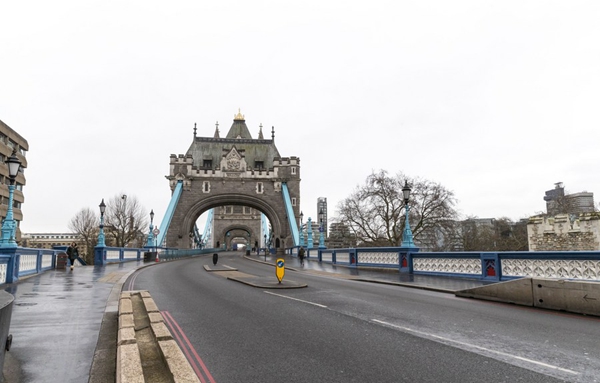
Photo taken on Jan. 5, 2021 shows a general view of the Tower Bridge in London, Britain, on Jan. 5, 2021. [Photo/Xinhua]
Britain on Tuesday marked one year since British Prime Minister Boris Johnson announced the first coronavirus lockdown in the country last year.
On March 23, 2020, Johnson unveiled measures to stop the spread of COVID-19. A total of 126,172 people have died so far from COVID-19, according to the latest official figures.
A national minute's silence was held at midday as part of a day of reflection. Britons are also encouraged to stand on their doorsteps at 2000 GMT with phones, candles and torches to remember the past year.
Johnson said in a statement: "The last 12 months has taken a huge toll on us all, and I offer my sincere condolences to those who have lost loved ones."
"Today, the anniversary of the first lockdown, is an opportunity to reflect on the past year -- one of the most difficult in our country's history," he added.
British Health Secretary Matt Hancock told the BBC that the past year has been "probably the hardest year in a generation" but treatments and vaccines now provided "hope".
Also on Tuesday afternoon, Johnson told a virtual press conference at Dowing Street that Britain is "step by step, jab by jab" on the path against the COVID-19 pandemic.
Using the press conference to address the nation on the anniversary of lockdown from Downing Street, he said that "at the right moment" a permanent memorial to those who died from coronavirus will be built and the "whole period" will be commemorated.
His statement came as a series of sombre ceremonies took place across Britain on Tuesday to mark one year since the start of the first nationwide lockdown.
"We're all fighting the same pandemic across the whole of the European continent... and vaccines are an international operation," he said in response to a question about the European Union's threats to block vaccine exports to Britain.
"We in this country don't believe in blockades of any kind, (it's) not something this country would dream of engaging in," he added.
Nearly 28 million people in Britain have been given the first jab of the coronavirus vaccine, according to the latest official figures. Johnson has said Britain was "on course" to vaccinate the top nine priority groups, including all over-50s, by April 15, despite the vaccine supply shortage next month.
On Monday, Johnson warned a recent surge in COVID-19 cases across Europe would impact Britain.
"People in this country should be under no illusions that previous experience has taught us that when a wave hits our friends, I'm afraid it washes up on our shores as well," he said.
"I suspect we will feel those effects in due course, that's why we're getting on with our vaccination program as fast as we can," he added.
National Health Service (NHS) England has warned that Britain is going to face a "significant reduction" in vaccine supplies from March 29 onwards.
Hancock said a need to retest 1.7 million vaccine doses as well as delays to doses arriving from India are the reasons why Britain is facing a "tighter" supply in COVID jabs next month. But the British government insisted that the country is on course to offer all adults a dose by the end of July.
Experts have warned Britain is "still not out of the woods" amid concerns over new variants and the risks of the public breaching restriction rules.
On Feb. 22, Johnson announced his long-anticipated "roadmap" exiting the lockdown, the third of its kind since the start of the pandemic. The March 8 reopening of schools was first part of the four-step plan which is expected to see all legal restrictions in England being removed by mid-June.
Other parts of Britain, including Wales and Norther Ireland, have also unveiled plans to ease the restrictions.
To bring life back to normal, countries such as Britain, China, Germany, Russia and the United States have been racing against time to roll out coronavirus vaccines.




